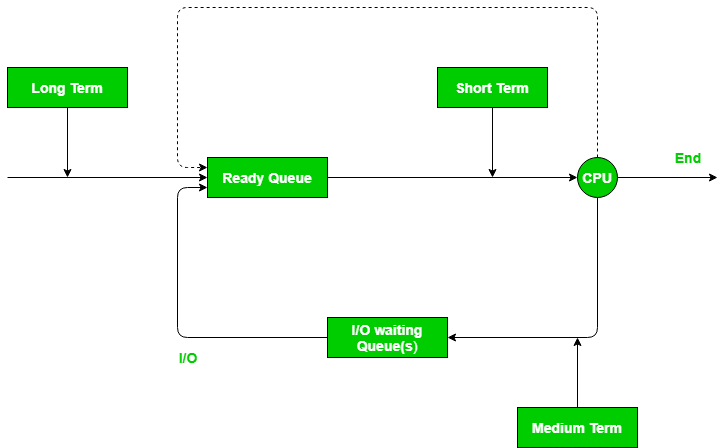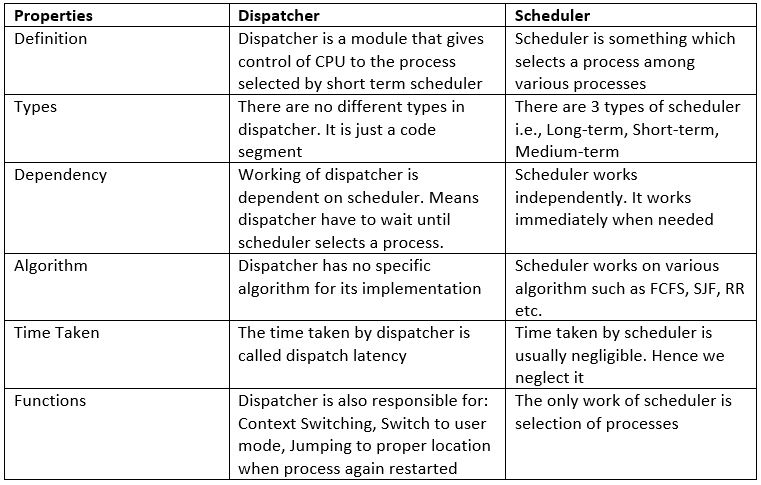Difference Between Dispatcher & Scheduler | Operating System - Computer Science Engineering (CSE) PDF Download
Schedulers
Schedulers are special system software which handle process scheduling in various ways. Their main task is to select the jobs to be submitted into the system and to decide which process to run.
There are three types of Scheduler:
- Long term (job) scheduler: Due to the smaller size of main memory initially all program are stored in secondary memory. When they are stored or loaded in the main memory they are called process. This is the decision of long term scheduler that how many processes will stay in the ready queue. Hence, in simple words, long term scheduler decides the degree of multi-programming of system.
- Medium term scheduler: Most often, a running process needs I/O operation which doesn’t requires CPU. Hence during the execution of a process when a I/O operation is required then the operating system sends that process from running queue to blocked queue. When a process completes its I/O operation then it should again be shifted to ready queue. ALL these decisions are taken by the medium-term scheduler. Medium-term scheduling is a part of swapping.
- Short term (CPU) scheduler: When there are lots of processes in main memory initially all are present in the ready queue. Among all of the process, a single process is to be selected for execution. This decision is handled by short term scheduler.
Let’s have a look at the figure given below. It may make a more clear view for you.

Dispatcher
A dispatcher is a special program which comes into play after the scheduler. When the scheduler completes its job of selecting a process, it is the dispatcher which takes that process to the desired state/queue. The dispatcher is the module that gives a process control over the CPU after it has been selected by the short-term scheduler. This function involves the following:
- Switching context
- Switching to user mode
- Jumping to the proper location in the user program to restart that program
The Difference between the Scheduler and Dispatcher
Consider a situation, where various processes are residing in the ready queue waiting to be executed. The CPU cannot execute all of these processes simultaneously, so the operating system has to choose a particular process on the basis of the scheduling algorithm used. So, this procedure of selecting a process among various processes is done by the scheduler. Once the scheduler has selected a process from the queue, the dispatcher comes into the picture, and it is the dispatcher who takes that process from the ready queue and moves it into the running state. Therefore, the scheduler gives the dispatcher an ordered list of processes which the dispatcher moves to the CPU over time.
Example:
There are 4 processes in the ready queue, P1, P2, P3, P4; Their arrival times are t0, t1, t2, t3 respectively. A First in First out (FIFO) scheduling algorithm is used. Because P1 arrived first, the scheduler will decide it is the first process that should be executed, and the dispatcher will remove P1 from the ready queue and give it to the CPU. The scheduler will then determine P2 to be the next process that should be executed, so when the dispatcher returns to the queue for a new process, it will take P2 and give it to the CPU. This continues in the same way for P3, and then P4.


|
10 videos|141 docs|33 tests
|
FAQs on Difference Between Dispatcher & Scheduler - Operating System - Computer Science Engineering (CSE)
| 1. What is the difference between a dispatcher and a scheduler? |  |
| 2. What are the key responsibilities of a dispatcher? |  |
| 3. What are the main duties of a scheduler? |  |
| 4. Can a dispatcher also perform scheduling tasks? |  |
| 5. How do dispatchers and schedulers collaborate to optimize operations? |  |
















